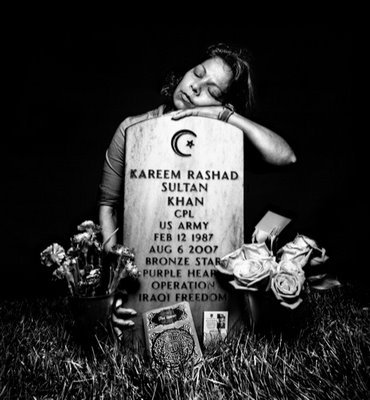 Have you ever heard of a photo essay being cited in a presidential race? Well, Colin Powell did it this morning on Meet the Press.
Have you ever heard of a photo essay being cited in a presidential race? Well, Colin Powell did it this morning on Meet the Press.Powell, the former Secretary of State who lost street cred when he stumped for the Bush Doctrine at the UN, said that he was moved by an image in a recent photo essay depicting a mother at the grave of her soldier son. The point, Powell said, is that the son -- who was 20 when he died in service of his country -- was a Muslim, something his party has suggested is unpatriotic.
"I feel strongly about this particular point because of a picture I saw in a magazine," Powell said, referring to the Sept. 29 issue of The New Yorker. "It was a photo essay about troops who are serving in Iraq and Afghanistan. And one picture at the tail end of this photo essay was of a mother in Arlington Cemetery, and she had her head on the headstone of her son's grave."
The photo essay is by 40-year-old New York photographer Platon (yes, he is professionally known only by his first name). Fifteen years ago, British Vogue named him the best up-and-coming photographer.
"You could see the writing on the headstone," Powell said. "And it gave his awards--Purple Heart, Bronze Star--showed that he died in Iraq, gave his date of birth, date of death. He was 20 years old. And then, at the very top of the headstone, it didn't have a Christian cross, it didn't have the Star of David, it had crescent and a star of the Islamic faith. And his name was Kareem Rashad Sultan Khan, and he was an American. He was born in New Jersey. He was 14 years old at the time of 9/11, and he waited until he can go serve his country, and he gave his life. Now, we have got to stop polarizing ourself in this way."
